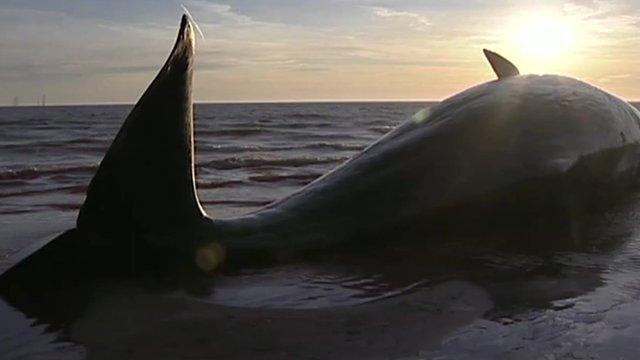Ballymacormick Point: Dead whale washes up on County Down coast
- Published
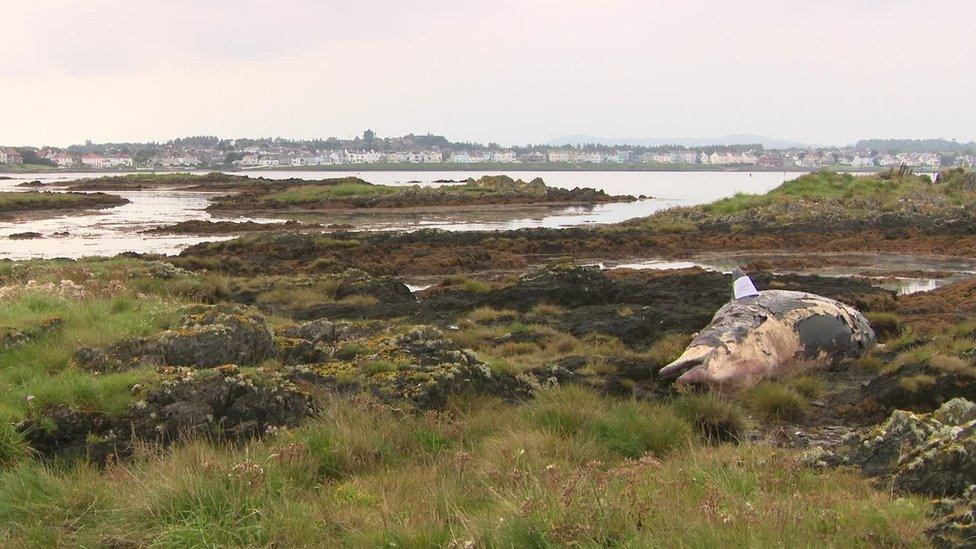
The whale carcass is being removed from Ballymacormick Point, between Ballyholme beach and Groomsport
A dead whale has washed up on the shoreline near Bangor in County Down, leading to the closure of access paths to Ballymacormick Point.
The National Trust restricted access, saying the carcass posed a safety risk.
"Given the difficulty of the terrain and size of the whale, this is a challenging removal process," it added.
It comes two days after two dolphins were rescued and helped back into the water after they became stranded near Castle Espie on Strangford Lough.
A female common dolphin and her calf were spotted lying in thick mud on the shore on Thursday morning.
A ranger at Castle Espie wetland reserve called for assistance and soon a vet and a team of volunteers from the British Divers Marine Life Rescue (BDMLR) arrived at the scene.
One of those who answered the call was BDMLR volunteer Ruby Free from Portglenone in County Antrim.
She told BBC News NI that the vet was the first rescuer on the scene and she covered the stranded dolphins with wet blankets to prevent them drying out.
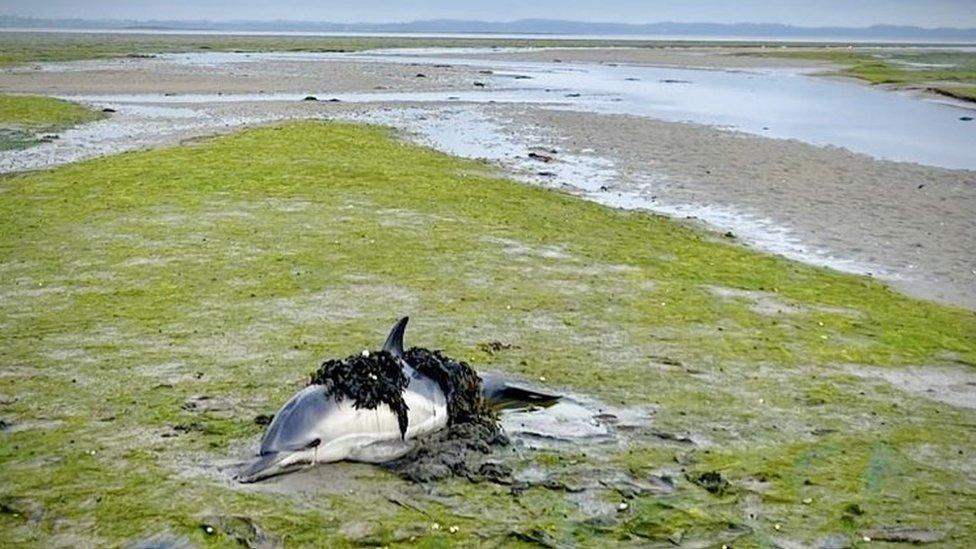
Volunteers photographed the scene as the rescue began on Thursday morning
"She did a really good job of that, and then the rest of us turned up and we were just trying to keep the dolphins wet until basically the tide came in a little further, because by that stage it was still hundreds of meters out," Ms Free said.
About an hour later, the BDMLR team, including Helen Beattie, Josh Anderson and Ingrid Houwers, attempted to re-float the dolphins in the rising water.
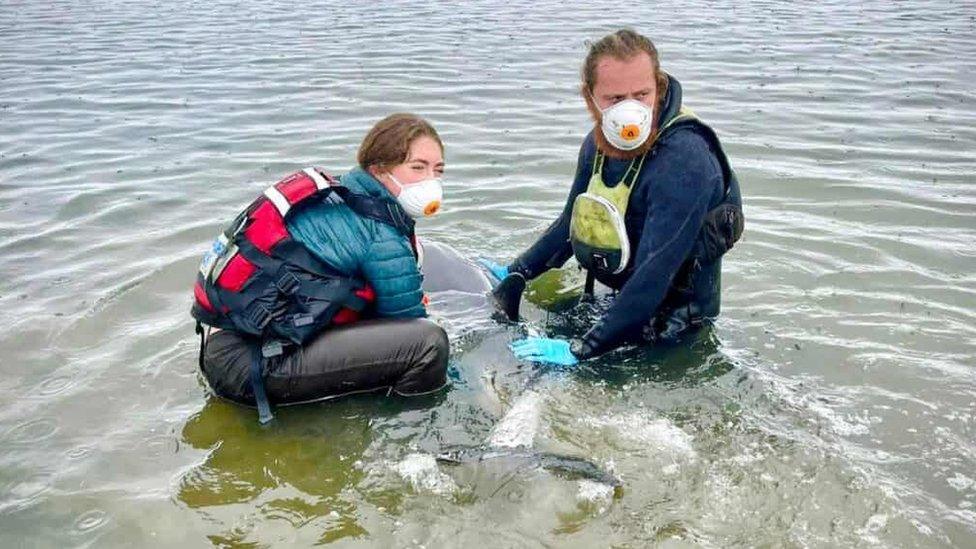
BDMLR volunteers Ruby Free and Josh Anderson with the stranded dolphin
"The way you do that is you get a tarpaulin," Ms Free explained.
"You have to dig a little bit under the dolphins' bodies, put the tarpaulin underneath, really delicately roll them onto it before you slide them out into the water."
However, she stressed that BDMLR medics are trained in this procedure and it should not be attempted by untrained members of the public with any wild animal.
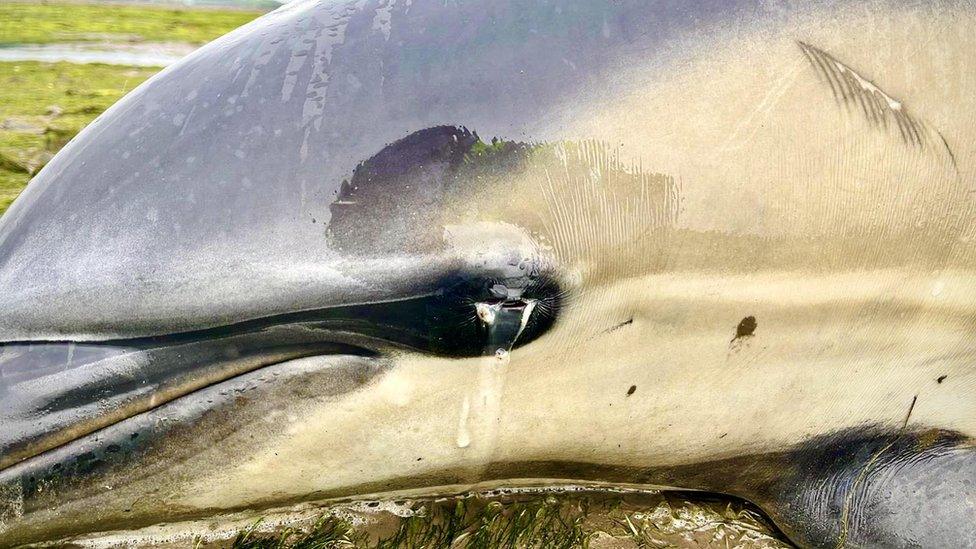
The dolphins were showing signs of eye damage after being stranded
"We made sure that the calf was positioned in front of the mum, so the mum would follow behind and encourage it out, but unfortunately, that didn't happen," Ms Free said.
"When we let go of the mother and calf the mum had a lot more strength and the calf, unfortunately, was still being pushed back onto the sand bank because of the strength of that tide."
The calf was "really struggling" in the shallow water and was soon showing showing signs of fatigue.
If the team had "just allowed it to carry on fighting the tide relentlessly, it might have actually been a lot worse for the little dolphin," Ms Free added.
"So we managed to get hold of the calf again and actually walked it out into much, much deeper water, and held it for about 20 minutes before it could get enough energy to try again."
When the volunteers felt the calf was strong enough to swim, they released it again and it was soon reunited in the lough with its mother.
"It was a brilliant, brilliant sight to see," Ms Free said.

Ruby Free said the rescue team felt "proud and happy" after the dolphins returned to deep water
She described it as "an incredible group effort" and praised her fellow rescuers for their quick thinking and "muscle power".
"It took a few of us to hold dolphins each, and then you have also the coastguard team who were looking after us looking after the dolphins," she said.
"And then you have the guys at Castle Espie that actually made the initial call that made all of this happen in the first place."
Posting on its Facebook page, the Portaferry Coastguard Rescue Team said both dolphins were "observed swimming into the distance and were are pleased to say they should make a full recovery".
Ms Free said the rescuers were happy not to have seen the dolphins for more than 24 hours, but were still concerned that they might become stranded again.
"Please keep your eyes peeled around the waters of Strangford Lough. If you see these dolphins in trouble again, or any marine life in distress please call BDMLR on 01825 765546," she added.
A Department of Agriculture, Environment and Rural Affairs (Daera) spokesperson said: "It is always sad to see marine wildlife becoming stranded and the volunteers from BDMLR did an incredible job to successfully refloat the common dolphins in Strangford Lough.
"Daera would like to thank all of the volunteers who assisted in this incident and the whole network of volunteers who are on standby and ready to respond at any time.
"Unfortunately the whale at Ballymacormick Point was already dead when reported to DAERA and it is the responsibility of the landowner and local council to assess whether it can be removed and making the necessary arrangements."
'Absolutely concerning'
Although mass whale strandings have been reported in Britain as far back as 1762, numbers are on the rise.
Cases have increased from an average of one whale stranding per year from the 1940s to the 1980s, to six per year from the 1980s to today.
One of the UK's worst strandings - a pod of 55 pilot whales - happened in July of this year.
About 55 whales were stranded on a Western Isles beach in July
Ecologist Conor McKinney told BBC News NI that the loss of a cetacean - a whale, dolphin or porpoise - is "absolutely concerning".
"[They] are very often highly protected and under severe threat and of high conservation value - so the loss of just one or two of these individual animals , it can be a big deal," he said.
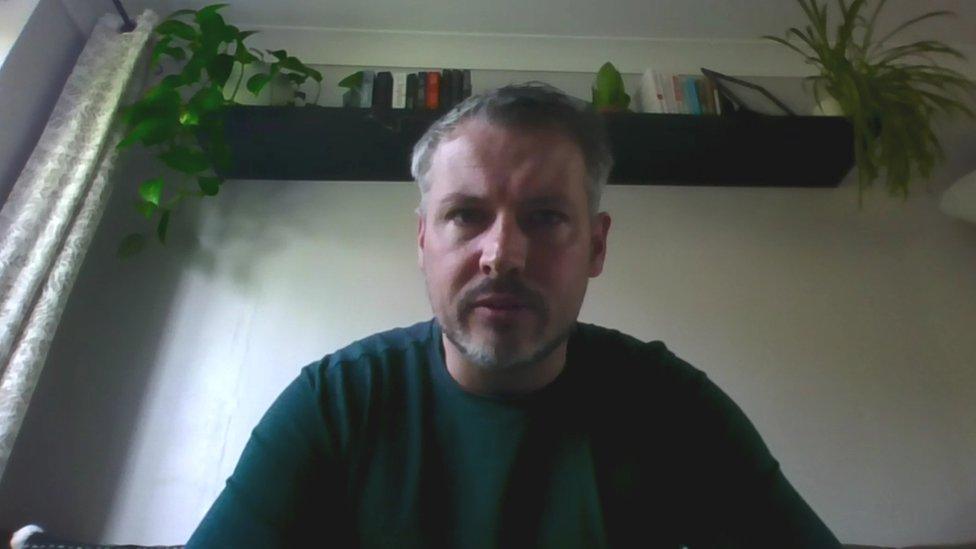
Senior ecologist and local conservationist Conor McKinney has urged the public to report any sightings
Mr McKinney said once the animals are stranded on the beach there is a "ticking clock" to rescue them.
"The sooner rescuers can get these animals back into the water, the better chance that animal has for survival," he added.
"I would urge anybody that is out on the beach to be looking for any other specimens that might indicate that this might be much larger than an individual stranding event, and to reach out to the Irish Whale and Dolphin Group."
- Published16 July 2023
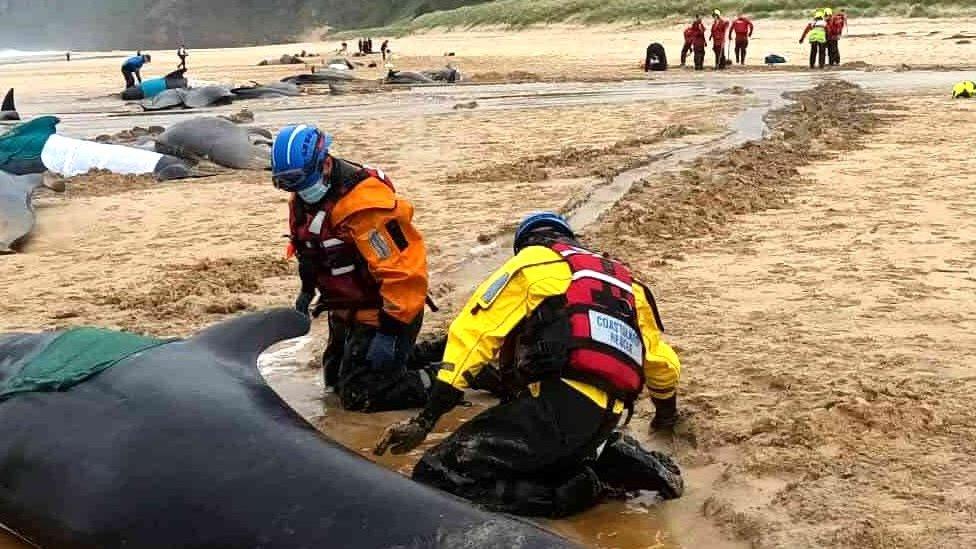
- Published6 September 2019
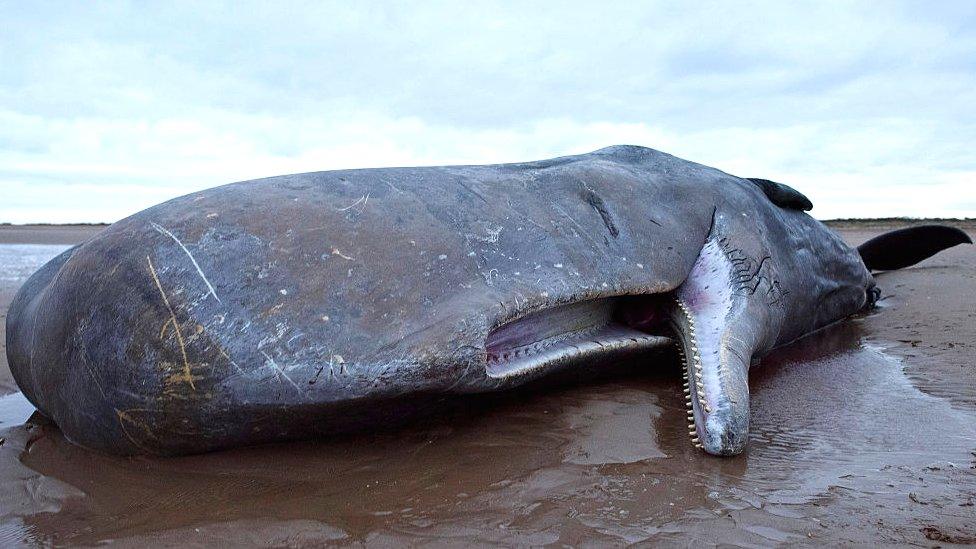
- Published25 January 2016
